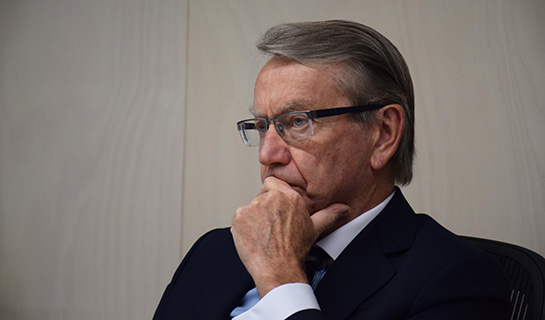Corruption Matters - November 2019 | Issue 54
The year in review
The 2018–19 year has seen the ICAC further consolidate itself as it has embarked with renewed vigour and determination in our work to expose, investigate and prevent corruption in NSW.

We have settled the new organisational structure, with the appointment of our first CEO, Philip Reed, at the beginning of the financial year, marking the final piece in the process.
While those matters are settled, the ICAC has continued to pursue an active work program. In 2018–19, we have seen some similarities to the previous year. For example, the number of matters received, at 2,743, has slightly dipped from the 2,751 received in 2017–18. In other areas, we have experienced some marked differences, with the number of public inquiry days soaring to 133 from the 47 recorded in the previous year. Corruption prevention (CP) recommendations in our investigation reports are also on the rise, at 46 more than doubling the 22 reported last year, while requests for CP advice have also increased to 180 (compared to 139 in 2018–19).
This financial year has also seen the ICAC reach a very important milestone, as March marked the 30th anniversary of when we began to operate. There is more information about our first 30 years in our 2018–19 annual report, but I am pleased to note that there are some special projects, which, while not necessarily timed to coincide with the anniversary, nevertheless have come to fruition during this time.
In February this year, the Commission publicly live streamed a public inquiry via its website for the first time to the world. The inquiry was Operation Gerda, an investigation into allegations concerning university contract security suppliers. Over the course of the public inquiry, we recorded nearly 5,000 users viewing the stream, enabling us to broaden our ability to reach the community and globally share our work transparently and in real time.
March saw the launch of our new website, an updated and contemporary communication medium with improved navigation and user-friendly corruption reporting forms, easy access to popular sections such as current investigations, a new preventing corruption section with fresh content, an events module for capturing and administering training requests, and a new online subscription facility for subscribers to opt-in and receive email news and events bulletins.
The ICAC’s website is its flagship external communications tool and I encourage readers to browse the new site, which can easily be done now via devices including mobile telephones and tablets.
Another highlight of our new initiatives for 2018–19 has been the commencement of the Strategic Investigation and Research Unit (SIRU), a joint initiative of our investigation and CP divisions, which is already delivering some impressive work in the proactive investigation and prevention sphere.
SIRU’s work in 2018–19 has resulted in it identifying apparent serious corruption activities that are now the subject of wide-reaching preliminary investigations. It is diligently working to produce strategic intelligence products that will inform and guide our resource allocation along with strategic intelligence reports that will identify emerging corruption risks, trends and serious and systemic issues as part of our CP work.
In March, the Commission initiated the establishment of a national, anti-corruption intelligence network, reflecting our focus on strengthening relationships between intelligence teams across integrity bodies, with an emphasis on proactive and strategic intelligence. Our aim is for this network to provide a platform for sharing tradecraft and collaborating on mutual issues and, so far, its membership includes intelligence representatives from all Australian states and territories.
In December, the Commission took stock of the first 30 years of its operations with the release of Corruption and integrity in the NSW public sector: an assessment of current trends and events. This landmark report examined a range of risks that face NSW public officials, including the blurring of lines between government and non-government sectors, the consequences of badly managed organisational change, and rules that unintentionally can encourage corrupt conduct.
It’s clear that, after 30 years of operations, the functions and work of the Commission – and other integrity bodies in NSW and around the country – are as relevant and needed today as they were when we, as Australia’s oldest such commission, were established three decades ago.
I encourage readers to take some time to read the latest annual report and review what has been a productive and, in a number of respects, groundbreaking period for the ICAC.
|
